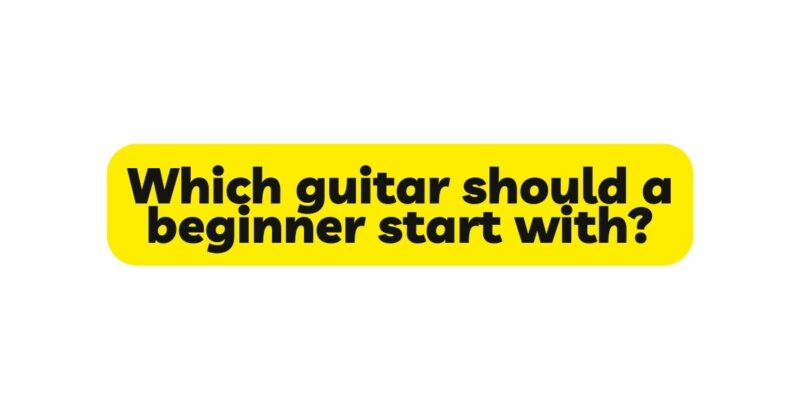For those embarking on their journey to learn guitar, selecting the right instrument is a crucial decision. With a plethora of options available, beginners often face the question: which guitar should I start with? In this article, we will explore the factors to consider when choosing a guitar for beginners. From acoustic versus electric to body types and playability, we will provide valuable insights to help beginners make an informed decision and find the perfect guitar to kickstart their musical adventure.
- Acoustic or Electric: Choosing the Right Foundation
The first consideration for beginners is whether to start with an acoustic or electric guitar. Acoustic guitars offer a more traditional and versatile approach, allowing beginners to focus on building finger strength, chord progressions, and strumming techniques. Electric guitars, on the other hand, offer a wider range of sounds and effects, catering to different musical styles and genres. Ultimately, the choice between acoustic and electric depends on the musical preferences and aspirations of the beginner.
- Body Types: Finding the Perfect Fit
Guitars come in various body types, including dreadnought, concert, and classical. Each body type has its own unique sound and feel. Beginners should consider factors such as comfort, body size, and playing style when selecting the right body type. For example, the dreadnought body type offers a balanced tone and is suitable for strumming, while the classical body type is known for its softer, nylon-string sound, ideal for fingerstyle playing.
- Playability: A Comfortable Learning Experience
Playability is crucial for beginners as it affects their overall comfort and ease of learning. Factors such as neck profile, action (string height), and fret size influence playability. A guitar with a thinner neck profile and lower action tends to be more comfortable for beginners to navigate. Additionally, smaller fret sizes can make it easier for beginners to form chords and play notes accurately. Trying out different guitars and finding the one that feels most comfortable is essential for an enjoyable learning experience.
- Quality and Budget: Balancing Performance and Affordability
While budget considerations are often important for beginners, it is crucial not to compromise on quality. Finding a guitar that strikes the right balance between affordability and performance is key. Cheap guitars can provide a solid starting point for beginners, offering decent playability and sound quality within a limited budget. It is advisable to seek guitars from reputable brands that offer affordable models with good build quality and reliable performance.
- Guidance from Experts: Seeking Advice and Recommendations
Seeking guidance from experienced musicians, guitar teachers, or music store professionals can be immensely helpful for beginners. These experts can provide valuable insights based on their experience and knowledge of various guitar models and brands. They can assist beginners in finding a guitar that suits their playing style, preferences, and long-term goals. Taking the time to consult with experts can save beginners from potential frustration and help them make an informed decision.
- Trying Before Buying: Hands-On Experience
Before making a purchase, beginners should try out different guitars to get a feel for their sound, playability, and overall comfort. Visiting music stores, attending guitar expos, or borrowing instruments from friends can provide opportunities for hands-on experience. Trying out different guitars allows beginners to assess the sound quality, comfort, and overall feel, helping them make a more confident decision based on their personal preferences.
- Online Resources and Reviews: Tapping into Knowledge
In addition to seeking advice from experts, beginners can also utilize online resources and reviews to gather information and insights on various guitar models. Online forums, video demonstrations, and customer reviews offer a wealth of knowledge from experienced guitarists and users. These resources can provide valuable guidance and enable beginners to make a more informed decision based on the experiences of others.
- Personal Connection: Finding the Guitar that Inspires
Ultimately, the right guitar for a beginner is the one that inspires them to pick it up and play. Personal connection plays a significant role in fostering motivation and dedication. A guitar that resonates with a beginner’s musical taste and style, and sparks joy and enthusiasm, will likely encourage consistent practice and progress. Trusting one’s instincts and choosing the guitar that evokes a genuine connection is vital for an enjoyable and fulfilling learning experience.
Conclusion:
Choosing the right guitar for a beginner is an important decision that sets the stage for a fulfilling musical journey. Considering factors such as acoustic versus electric, body types, playability, quality within budget, expert guidance, hands-on experience, and personal connection are key to finding the perfect instrument. Remember, the guitar should be a source of inspiration, enabling beginners to enjoy the learning process and progress toward their musical goals. With careful consideration and exploration, beginners can select a guitar that serves as a trusted companion, empowering them to strum the chords of their dreams and embark on a lifelong musical adventure.


